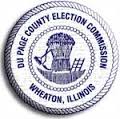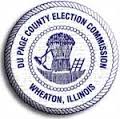DuPage County, IL. (ECWd) –
James P. Rome, LTD
A Professional Legal Corporation
517 Lavergne Avenue, Wilmette, IL 60091
(847) 917-3540
FOR RELEASE: Immediate
DATE: 5/5/2015
VENDOR CHARGES DUPAGE COUNTY ELECTION COMMISSION’S
PROCUREMENT PROCESS FOR E-POLL BOOK SOFTWARE & SERVICE
NOT TRANSPARENT AND ACCOUNTABLE
VOTEC Corporation of San Diego Asserts DuPage’s Purchase of Electronic Poll Book Software & Service had Flawed Protest Procedures – Thwarted by Delay, Obfuscation & Conflicts of Interest
WHEATON, IL – Yesterday VOTEC Corporation of San Diego filed a complaint in the 18th Judicial Circuit Court of Illinois against the DuPage County Election Commission and individual defendants due to its inability to prepare and file a meaningful and timely protest regarding the recent purchase of electronic poll books. This inability, VOTEC claims, is because vital public records were either not created or made available, demonstrating a lack of transparency and accountability.
VOTEC was among the vendors who responded to the Election Commission’s Request for Information in April 2013 and two Requests for Proposal, once in November 2013 and again in August 2014 for electronic poll book software and service, which provides a means for checking and managing voter registration at polling places on Election Day. Following the one-and-a-half-year procurement process, the Commission ultimately awarded the contract to Hart InterCivic of Austin for nearly half a million dollars.
VOTEC has contended from the start that failing to examine the already installed and successful Cook County system that would have been copied to DuPage County was a dereliction of fiscal responsibility. VOTEC’s price was just $1,000 above what was hastily paid to Hart. VOTEC is far more successful in Hart’s home state of Texas for many reasons, but most notable is their many-year head start.
On Nov. 20, 2014, VOTEC’s counsel, James Rome, filed the first vendor protest with intent to amend pending review of public records sought through the Freedom of Information Act (FOIA). Rome says that responses for his requests for basic information of the procurement for the E-poll books were repeatedly delayed, denied and incomplete. The Election Commission stated that it had no obligation to create records, only to maintain them. On Feb. 11th, VOTEC’s attorney filed an amended protest, despite the lack of full and complete FOIA responses. Nine days later, the protest was denied.
Specifically, the most significant records VOTEC sought, but never received, were evaluation committee deliberations. Attorney Rome asked, “How can the Commission justify a half-million dollar contract funded by a federal grant without anything to back up the decision making?” And, “Why provide the right for a vendor to protest, then not provide the information to the vendor to exercise that right? It’s a Catch 22.”
The following month, VOTEC’s counsel filed an appeal to Commissioner Chairwoman Cathy Terrill, according to procedure. The appeal had an unusual request for Terrill to recuse herself from making the decision, as public records show that she participated in the proceedings of the evaluation committee. Terrill did not recuse herself and denied VOTEC’s appeal two weeks later. The question remains: Was a line crossed between such participation and decision making?
Rome said, “From start to finish, our right to protest was thwarted by delay and obfuscation.”
In April 2013, the Election Commission sent out a Request for Information to leading vendors for electronic poll books. VOTEC was among the vendors requested to make short, informal presentations to the Commission five months later in September 2013. Lawsuit exhibits contain affidavits by two VOTEC representatives stating that Commission Executive Director Robert Saar approached them at an election conference in Springfield the following week and told them that “his commissioners were not pleased with the demonstration from the week earlier” and “(VOTEC CEO) Mr. Medcalf would not be welcome in the future to their offices.”
DuPage’s $499,000 purchase for E-Poll Books was largely funded by a federal Help America Vote Act (HAVA) grant. In February 2012, the Illinois State Board of Elections alerted the Election Commission that the deadline for requesting HAVA funds was Dec. 1, 2014. The Election Commission signed a contract with Hart one week before the deadline. On Dec. 10th, the County Treasurer issued a check to Hart for the full amount. Five days later, on Dec. 15th, Saar sent in the request for federal funds.
VOTEC listed several requests for relief in the lawsuit, including: termination of the Hart contract; a re-evaluation of all proposals; a re-solicitation of proposals; or, if HAVA funds cannot be easily recouped, granting all costs involved in preparing the proposal and pursuing the protest process.
-30-
EDITOR: Attached is a copy of the complaint #2015MR000589. Exhibits available upon request. Contact James Rome at James P. Rome LTD, Wilmette, IL [email protected] (847) 917-3540.
[gview file=”https://edgarcountywatchdogs.com/wp-content/uploads/2015/05/DuPageElectionCommission.pdf”]









1 Comment
ECWDogs
Posted at 22:18h, 05 MayVOTEC Corp. files suit v. DuPage County Election Commission – http://t.co/QIF5k4vlze